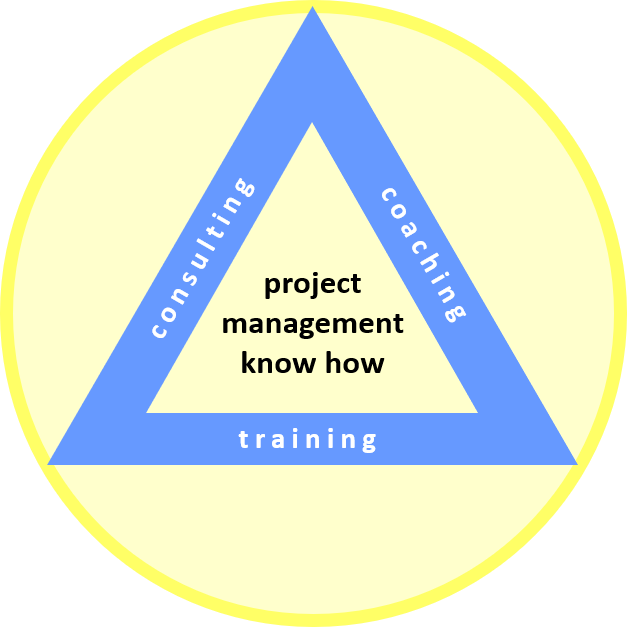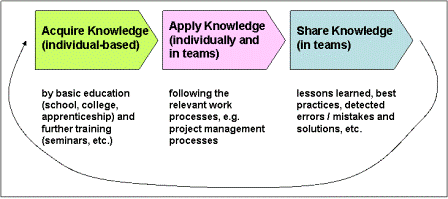- Home
- Project Portfolio
- Knowledge Management
Knowledge Management
Published: 2009-06-07
Last updated: 2022-03-20
Conscious knowledge management is a main factor that supports organizational learning. We want the organization, e.g. our company that supports our projects and ourselves, to continuously improve. Here we focus on aspects that are relevant for project management. Our organization shall be a learning organization in a sense that it - as a whole - improves its abilities to support the management of projects.
Learning organization
"Learning organizations are organizations where people continually expand their capacity to create the results they truly desire, where new and expansive patterns of thinking are nurtured, where collective aspiration is set free, and where people are continually learning to see the whole together."
"Organizations learn only through individuals who learn. Individual learning does not guarantee organizational learning. But without it no organizational learning occurs."
Both quotes are taken from Peter M. Senge: The Fifth Discipline. The art and practice of the learning organization, London: Random House (1990).
Lessons learned by the organization are based on lessons learned by the people who belong to that organization. Since people carry the learning it is vital to communicate what is learned. That counts as well for all lessons we learn from our work on projects.
Consequently, we define knowledge of an organization as the knowledge carried by the people working for that organization, together with processes that coordinate and combine knowledge of individuals in favor of the overall outcome of the organization.
To a large extent, communication of our lessons learned takes place on a direct, face-to-face basis. A learning organization enables this by creating an environment where people can meet personally, work together, talk to each other openly, discuss their problems, and create new ideas of solutions. Where ever possible, this calls for collocated project teams; if we have to work in virtual teams then we should create occasional opportunities to meet personally, at least for the major project milestones.
Beyond these informal opportunities for exchanging information, knowledge, best practices, and worst practices, we need a more formalized process in order to benefit as an organization.
Knowledge Management Process
On a generic level, this knowledge management process could look as follows.
This knowledge management process is recursive, it never ends. Our picture explains it in its most generic form, thus giving us a holistic or systemic view. From this perspective, knowledge management does not require any specific IT solution, although we will show below that IT support is helpful.
We acquire initial knowledge in different forms:
- Through basic education: we acquire knowledge in school, college, or an apprenticeship.
- Through further training: our organization offers us participation in seminars on technical or management subjects, in terms of hard and soft skills.
After acquiring knowledge, we usually apply it, individually and in team work. Here, we focus on application of knowledge that takes place in our working environment by following predefined processes, e.g. project management processes. In this step, we implicitly obtain a lot of experience through learning by doing. It is essential that we document what we plan, what works, what does not work, and how we solve problems.
From application of knowledge, we gain lessons learned and best practices which we naturally share in teams with our colleagues and friends. That includes detected errors and mistakes we made, as well as their solutions. Let us point out that this represents a fundamental shift of paradigm in our organizational culture: the organization does not emphasize avoidance of errors and mistakes (as long as they are not repeated), but rather encourages detection of errors and mistakes in order to obtain solutions.
Project Management Training
The project management training system of the organization is fundamental. Most new employees or members use it as their main, if not only, opportunity in order to acquire necessary skill levels in the beginning and further development of their career.
Best Practice Sharing
A lot of best practice sharing will take place in informal ways: members of different project teams meet to have a cup of coffee or tea (smoking cigarettes is not too popular anymore), go for lunch or dinner together, chat about their work, and thus, share experience. As a learning organization, we would structure and organize best practice sharing. In terms of project management, the most important tools are lessons learned workshops, e.g. for effort estimation, risk analysis, contract management, to name just a few.
IT Support
Some of that best practice sharing, we can support by securing knowledge gained by project managers and team members. This knowledge comprises experience what works and experience what does not work, what we should not do again. In order to secure this kind of knowledge we need an IT-based project management information system that supports project management processes, and is supported by project managers and their teams. It requires that we document planned work, actual work, desired results, actual results, deviations, problems, and solutions (cf. the sub-section Project Records).
Return to Project Portfolio Management
Return from Knowledge Management to Home Page
|
|
|


Your Comments
Have your say about what you just read! Leave me a comment in the box below.